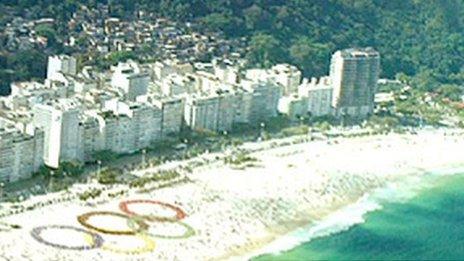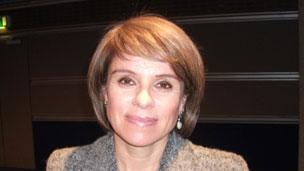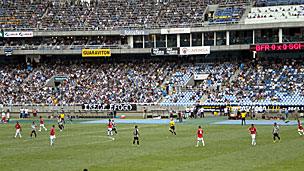Running the 2016 Rio Olympics
- Published

Sports and tourism expert Jeanine Pires is heading up the new government organization - Brasil 2016 - that will coordinate the various infrastructure projects and other aspects associated with the 2016 Olympic Games in Rio de Janeiro.
And she is aware of the size of the task ahead of her and Brazil, a nation she describes as a "land of joy, sports, and business".
"We are very happy and confident, and aware of the responsibility we have to not only run the big events, but also to continue Brazil's growth," she says.
The World Cup and the Olympic Games will bring significant benefits to the country, as a result of investment in airports, roads, urban transportation, sport venues, hotels, telecommunications, and environmental projects.
And Ms Pires says these should provide business opportunities for entrepreneurs and experts in planning, engineering, constructing and managing large scale infrastructure projects.
Her office will be tasked by the games organising committee to carry out this work.
"The macroeconomic environment and political stability assures good conditions for these new [infrastructure] investments," says the former head of Embratur, the organisation promoting Brazilian tourism around the world.
Continental responsibility
However, it is only a fairly recently achieved economic stability that has given Brazil the confidence to bid to host the Olympics in 2016 and also the 2014 World Cup.

Ms Pires' has goals ahead of and after as well as during the 2016 games
"This was very important when we were thinking about the long term and hosting big events like the World Cup and Olympic Games," says Ms Pires, an expert in tourism economics.
In 2010, Brazil's GDP growth is expected to reach 7.5%, with one-fifth of that growth being accounted for by infrastructure projects.
"These sporting events will help us accelerate programmes that we need to introduce," says Ms Pires.
And organisers are confident hosting the event will have huge impact not only in Rio, but in Brazil and in the entire continent.
Initial Brazilian surveys demonstrate that the investment of £4.1bn (4.8bn euros; $6.5bn) in the Olympic Games will generate more than four times that to the country's economy between now and 2027.
After-school activities
A total of 55 sectors of the Brazilian economy are envisaged as experiencing direct benefits from the Olympic Games, especially construction, housing, services, gas and oil, technological and information services and transport.
And Ms Pires estimates that more than 120,000 jobs a year will be created by 2016.
"We have important goals to be achieved before, during and after the games," she adds.
On the social inclusion side, a programme called Second Half Time will offers after-school activities such as sports, adult supervision, and food for students of public schools "exposed to social risk".
In addition, run-down areas, such as the port in Rio de Janeiro, are already being improved, she says.
"We do not expect these sporting events to solve all our problems - that would be crazy," says Ms Pires.
"But we have a chance for the world to see past the stereotypes. It is important to show we have changed."
Olympic stadium

The Joao Havelange Olympic Stadium in north Rio is already in constant use by the city's football teams
Much of the advanced work, such as improvement of public transport and urban roads, will be carried out in advance of the Olympics for the 2014 World Cup, which is being hosted in 12 Brazilian cities, including Rio.
There, the iconic Maracana Stadium will be refurbished for the World Cup and will be available for the Olympic opening and closing ceremonies.
In addition, the Olympics will benefit from improved transport connections to the stadium being build for the World Cup.
Meanwhile, track and field events in 2016 will be held in the Joao Havelange Olympic Stadium, in the Engenho de Dentro neighbourhood of Rio, which is already up and running having been build for the 2007 Pan-American games.
It also currently hosts the football matches of Rio clubs Botafogo, Flamengo, and Fluminense.
The Olympic stadium is situated in the north zone of the city and a new motorway was built three years ago to connect the stadium to the central zone and middle-class southern zone of Rio, so that part of the infrastructure is already in place.
However much work remains to be done in the Engenho district, including expanding the stadium from 47,000 to 60,000 capacity, between now and 2016 before it is ready to host the games.
'Brazilian face'
At the moment, however, Ms Pires and her colleagues are talking to their counterparts in other countries that have already hosted major sports events, such as Germany, South Africa, Canada and, now, the UK, which will host the 2012 games.
"All of them have a lot to exchange with us with their experiences, which will help Brazil to deliver the games with great venues, organisation and professionalism," says Ms Pires.
After the London 2012 Olympic Games and Paralympic Games finish, the global sporting world will be looking at Brazil for four intense years.
"We have to face the challenge of delivering the events in a professional manner, but with our own face and our soul," says Ms Pires.
"We will deliver peaceful, well organised and joyful games; Brazil is working to ensure that in 2014 and 2016 the world will have games of celebration and transformation."